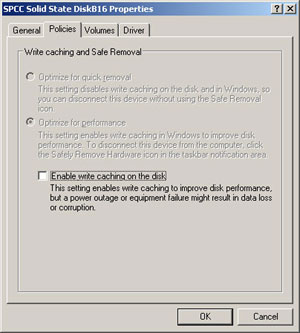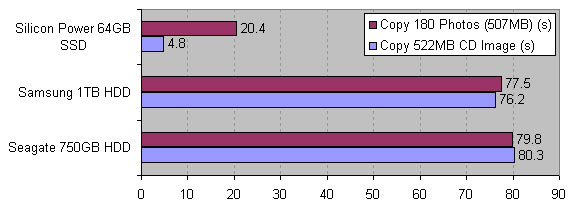|
|
Advertisement:
|
|
Silicon Power 64GB 2.5" SATA SSD |
|
Join the community - in the OCAU Forums!
|
Benchmarks Continued
Now for some fairly unscientific but more real-world oriented file copying. Two data sets were tested, one being a single large file (552MB CD image) and the other being many smaller files (180 photos totalling 507MB). For this test we first make sure that the Windows write cache is turned off for the drive being tested:

An interesting problem arises here, because an obvious potential bottleneck will be the source drive. A simple kludge to get around this that I've used in the past is to copy the data set and paste it onto the source drive, allowing that to complete, before pasting it again onto the target drive. This encourages Windows to cache the data set in the 2GB of RAM in the testbed. If this wasn't working and we were limited by the speed of the source drive, all target drives would return the same speed. As they don't, we can assume that bottleneck is not an issue. All tests are repeated 3 times and the average calculated.

This is an absolutely stellar result. I, and probably you, didn't believe it at first. So, I ran the tests again with the SSD. A clean reboot, make sure the write cache is disabled, copy the dataset, check the stopwatch. We saw in the earlier benchmarks that the sequential write speed of the SSD was better than the mechanical drives, but this is isn't a merely "better" result. For the single large file copy, the platter-based drives took nearly twenty times as long! There may be some experimental error here, but I can't see it, and some further miscellaneous file copying confirmed that this really is incredibly fast to write files to. So, I have no real explanation for this result, and am tempted to set it aside, but it had to be reported.
Single-Drive Testing:
But having seen all the benchmarks so far, it has to be said, that is not a particularly realistic representation of how this kind of drive will be used. You're not going to buy a 64GB SSD to put in an existing system as a storage drive. Realistically you're going to use it as the operating system, virtual memory and applications drive, to get the maximum benefit. In fact in this world of handy network storage it's likely the SSD will be the ONLY drive attached to a system, especially if that system is portable. So, let's play around with that for a while.
I built another testbed using the following:- ASUS P5K/EPU (P35, LGA775) Motherboard
- Intel Q6600 CPU at 3GHz
- 2GB Kingston HyperX DDR2 Memory
- XFX GeForce 9800GT 512MB Video Card
For this testbed we will install the OS and applications on two drives. Firstly, the Silicon Power SSD. Secondly, the 1TB Samsung drive that performed the best in our testing earlier. By swapping the drives in and out of the system we can isolate the performance of the SSD vs the hard drive in a range of common tasks. To start with, let's try simply booting the operating system.
A vanilla WinXP install was created on both drives. The latest drivers for motherboard chipset and video card were installed, plus WinXP SP3 and all current updates as at the time of testing. This process was performed on the SSD and then the 1TB Samsung drive and then the machine was disconnected from the network.
We want to eliminate the initial BIOS loading time, as that is not affected by the drives and depends on your motherboard and installed components. The SSD and HDD both detected instantly with no delay added there. So, we timed how long it took the system to go from the last BIOS screen vanishing, to loading the Windows desktop and the hourglass vanishing from the cursor. This was repeated 3 times per drive and the results averaged (they were all within .1 of a second anyway!)

Well, it's not the "instant boot" we may have been hoping for, but nearly 5 seconds isn't too shabby. Why, if you saved that much time turning on your PC every day for a year, you'd save nearly half an hour. ;)
|
|
Advertisement:
All original content copyright James Rolfe.
All rights reserved. No reproduction allowed without written permission.
Interested in advertising on OCAU? Contact us for info.
|

|


